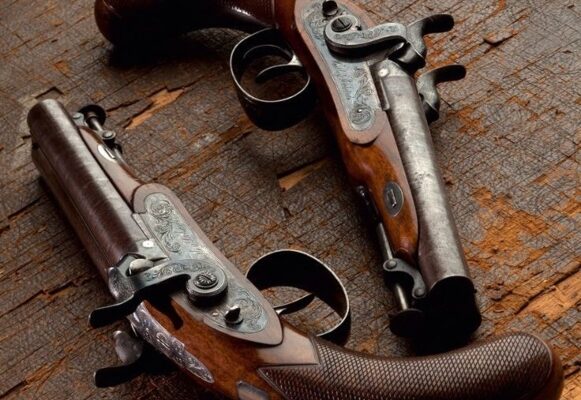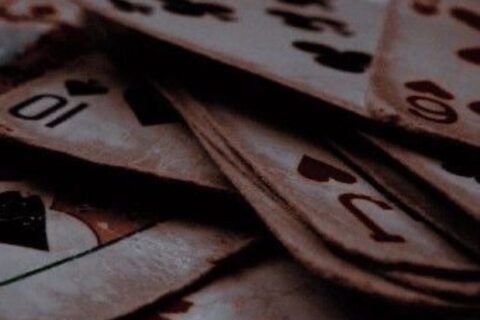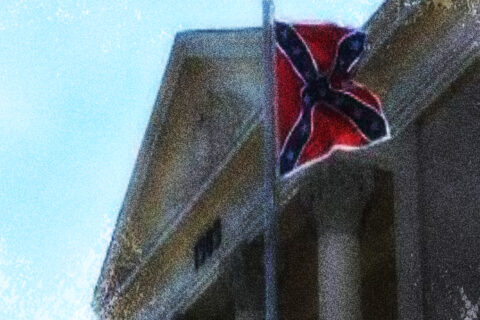Many Southern traditions experienced birth and death throughout the region’s long history. Following the War Between the States, a near extinction of the old antebellum customs took place. During the days of the Old South, men often settled disputes via means which differed relative to the social class the men belonged to. The lower classes generally adhered to the time tested custom of settling a conflict via the use of their fists. However, in contrast to this bare-knuckle tradition of the lower classes, the Southern gentry, most stalwartly within the Deep South, embraced a more detailed and civilized shibboleth. This differential consuetude of handling conflicts manifested as the gentlemen’s duel. The purpose of this piece seeks to detail a brief history of the Southern Duel and advocate for its return within contemporary conflicts of a socio-legal manner.
Tracing back to the Colonial period, Tidewater gentry and Deep South aristocrats infamously utilized pistol duels to settle grievances. A favorite among the planter class, this custom existed in the mainstream until the War Between the States. Often ridiculed as a barbarous act, dueling was often viewed as an honorable act. Specifically within the Mississippi Delta Region, dueling was so widespread and in vogue that the planters there reacted in hostility against opposition to it. Some records may indicate that certain areas would require less steps when dueling in order to make it deadlier. However, the morbid brutality of combat in the War, debilitating collateral civilian damage, war crimes, collapse of the planter aristocracy, and continued mass deaths of the populace due to starvation and disease led to a distaste for wonton killing. That being stated, dueling was a formal event and often viewed as a estimable endeavor in defense of one’s honor. An inveterate custom to no end only at the advent of war, some states still legally recognized it into the early 20th Century. Andrew Jackson was a notable example of the Southern pistol duelists. Another noteworthy duelist was that of Alexander Keith McClung. So deadly was he with dueling pistols that he garnered the nickname “The Black Knight of the South.”

Though popular below the Mason-Dixon Line, the tradition also found practice in the North. Quickly running its course in the North, the practice had already ended by the time the War had broken out. Though not remotely as popular in the region, dueling still held quite a bit of sway. The most infamous example of a duel took place in New Jersey on 11 July 1804. Known as the Burr-Hamilton Duel, the event shocked the country. Vice President Aaron Burr successfully shot and killed Alexander Hamilton in a high profile political dispute, subsequently destroying dueling in the North.
Having covered a brief history of the infamous pistol duel, contemporary society necessitates the return of the practice. Gentlemen, for all practical purposes, no longer exist within North America, and little remains allowing men to settle disputes in a martial, but fair, manner. While the original system of dueling found abuse among its patrician participants, a lack of such a legal framework also allows for cowardly abuse of a much different manner. It is of no secret that some men (and women) are allowed to simply abuse others with little real repercussions. This manifests differently depending on the individual, but ranges from hidden domestic abuses on their spouse and children to vile language flung across social media to personal disloyalty and betrayal. We live in an age where a stranger can unleash all manner of crude, deeply offensive language at another stranger, and without the slightest repercussions. Dangerous gossip is allowed to freely flow in modernity; whereas, in another age, it would have been prohibited (to some degree). If a drunkard hurls disgusting abuses at your wife or girlfriend, you are unable to physically correct his slight because of our misguided legal system and our culture’s toxic litigious nature. It is unreasonable to expect a grown man, whose honor has been insulted by another individual, often of lower or equal social status, without the means of defending said honor.
Dueling could also restrict the powerful from abusing those below their station of wealth and influence. Earlier this year, Jeff Bezos went out of his way to doxx, as well as insult, some of his customers over their views on BLM rioting and “protesting.” If dueling were allowed, those customers, and if they truly held to their beliefs, could challenge the billionaire to a duel to settle the disputes. In such a case, it’s rather likely that men like Bezos would either quietly apologize or “pay off the debt of dishonor,” if not, they would be branded as rich cowards. Dueling ensures that men truly “practice what they preach.”
Another foundational reason for the return of pistol dueling would allow for a check against grievances held against political officials. Various office holders are deeply corrupted by the system and should be more fairly challenged by opposing individuals within the political system. Not much more may genuinely be explained here. Officeholders’ negative reputation precedes them.
While largely conjecture, an argument may certainly be made in favor of the return of the chivalrous pistol duel. A well regulated and meticulously enforced system of dueling would work wonders to settle disputes within a specific set of guidelines. It existed as a gentleman’s tradition which allowed for men to hold their prestige should another man feel so inclined to insult him. With no means to effectively settle wrongdoing and no integrity in the justice system, American society exists perpetually within a state of bullying, for lack of a more sophisticated term. Cowardice prevails, and society is weak. The art of manly pistol dueling, or some derivative of it, must return.
“The White people of the South are the greatest minority in this nation. They deserve consideration and understanding instead of the persecution of twisted propaganda.” –Strom Thurmond






Dueling is pretty natural. We do it as kids. Did you ever play with a brother or neighborhood friend who hogged a toy you wanted? You definetly got into scuffles over it, even if you don’t remember. It’s what men do.
Dueling lasted much longer in Europe, mostly with swords though and usually to first blood. Otto Skorzeny a Lt. Col. equivalent in the SS had a prominent Dueling scar on his face. Truly interesting character. Fought for the SS, military adviser/body guard to Egypt’s Nassar, Adviser to Argentina’s Peron, Leader of a Anti-communist militia in spain and did intel work for the Mossad against egypt’s rocket programs.
You left out my favorite form of dueling – sword. In addition to MMA and the drunken shittalk fistfights, I fenced both foil and épée in college.
I have long fantasized about a return to dueling because I have such irascible pedigree. Every single male in my family has fought and trained in some form of boxing or martial arts going back to Ireland and Italy. Personally, I’m built exactly like Connor McGregor, in BJJ I was the exact same weight class 5’9″ 156. My great grandfather was the Navy Atlantic Champ lightweight division just after WWI. And my grandfather was a heavyweight Golden Gloves fighter back in the 40s.
I digress – generally, the rule was you’d call out the offending party to challenge. But, they’d have first choice of weapons. Being that gentlemen “of the age” weren’t of the uncouth class you’d either fight with dueling pistols or cavalry sabres. However, woe be it for the gentlemen who would be offended by an aristocratic psychopath who trained for multivariate methods of dueling. They would often go around picking fights with utter impunity.
History doesn’t relish the death of that seditious piece of garbage Alexander Hamilton to the extent that it should. Aaron Burr was a national hero that shot the very first Rothschild collaborator posing as the Secretary of the Treasury. The outcome of this particular duel put the fear of Yahweh in the hearts of the schutzjuden and Black Guelphs alike.
May the sacred act of Holmgang be invoked again!
Old school irish shillelagh law needs a resurgence as a sport between gentleman.
Here’s a cool shilelagh fight https://youtu.be/mV7tb1Y6fAg Russians and slavs love Celtic tradition